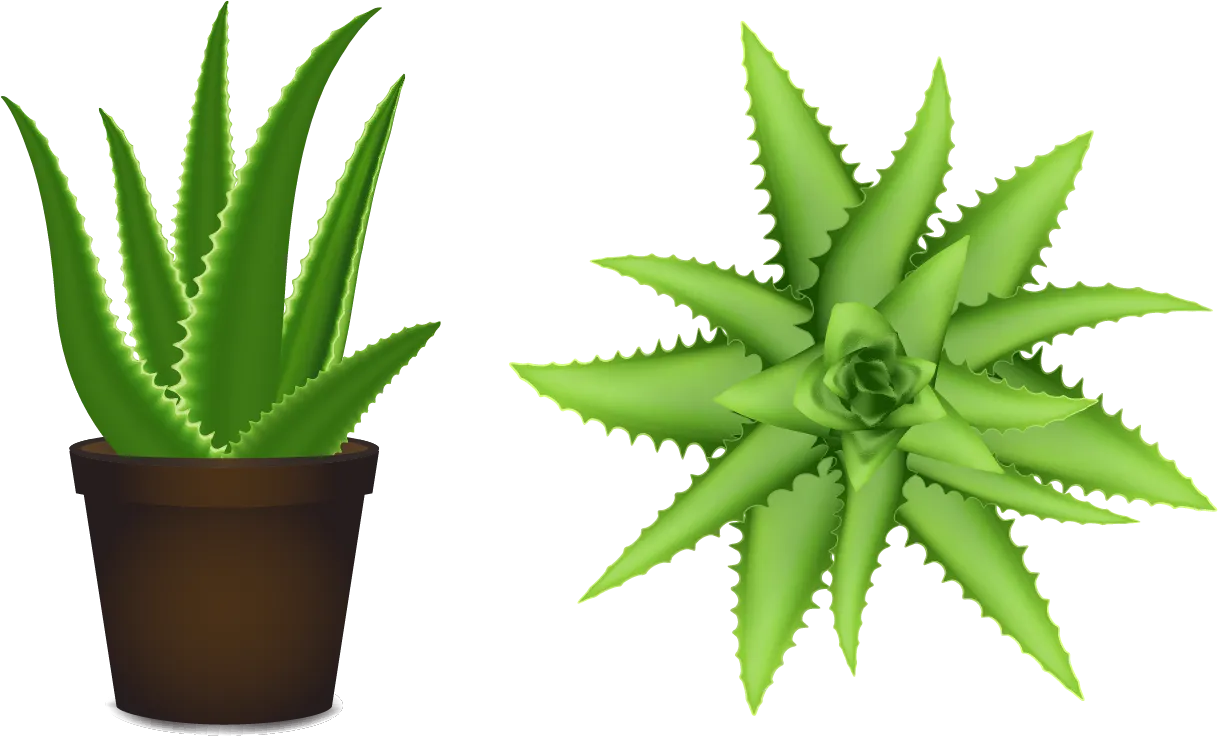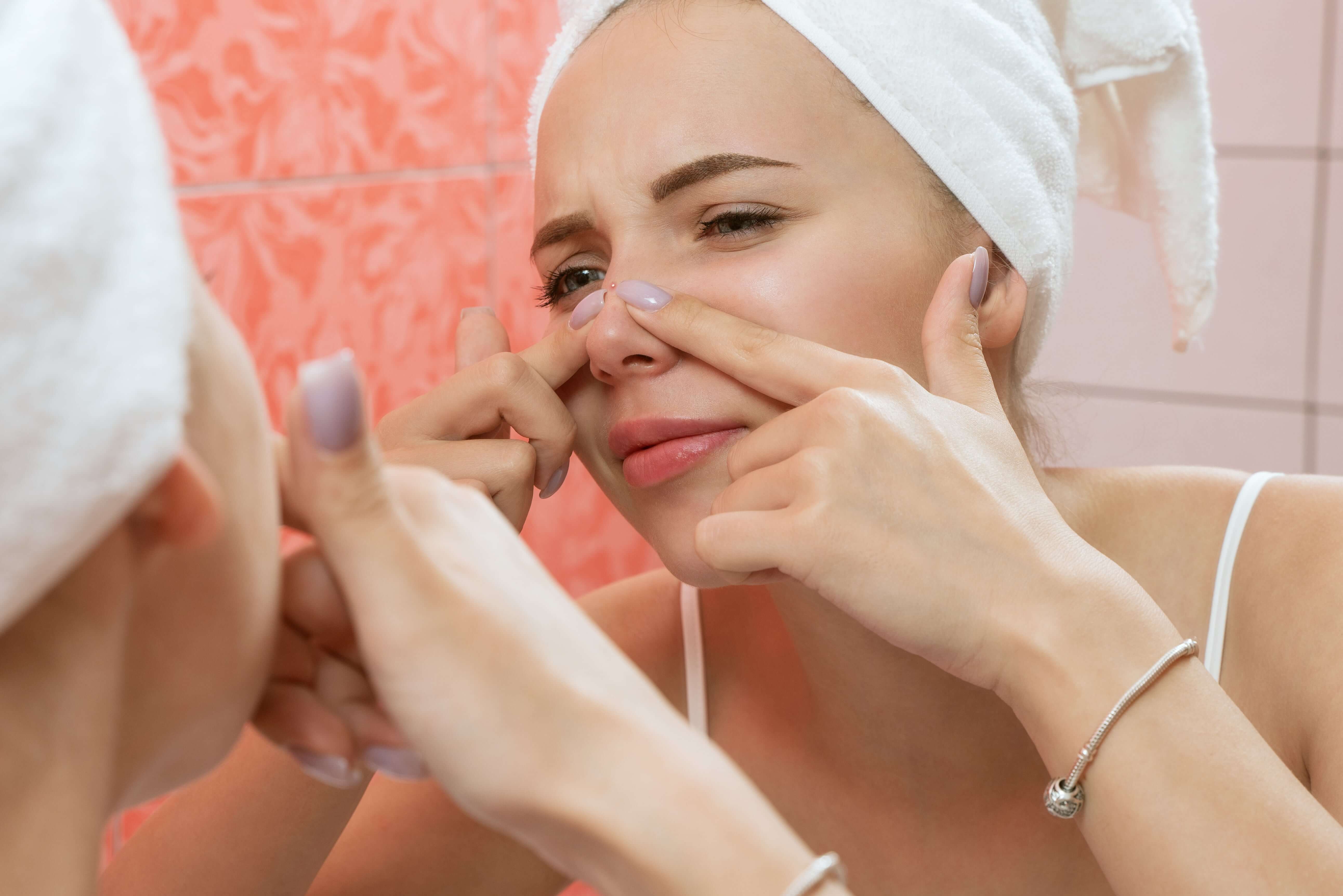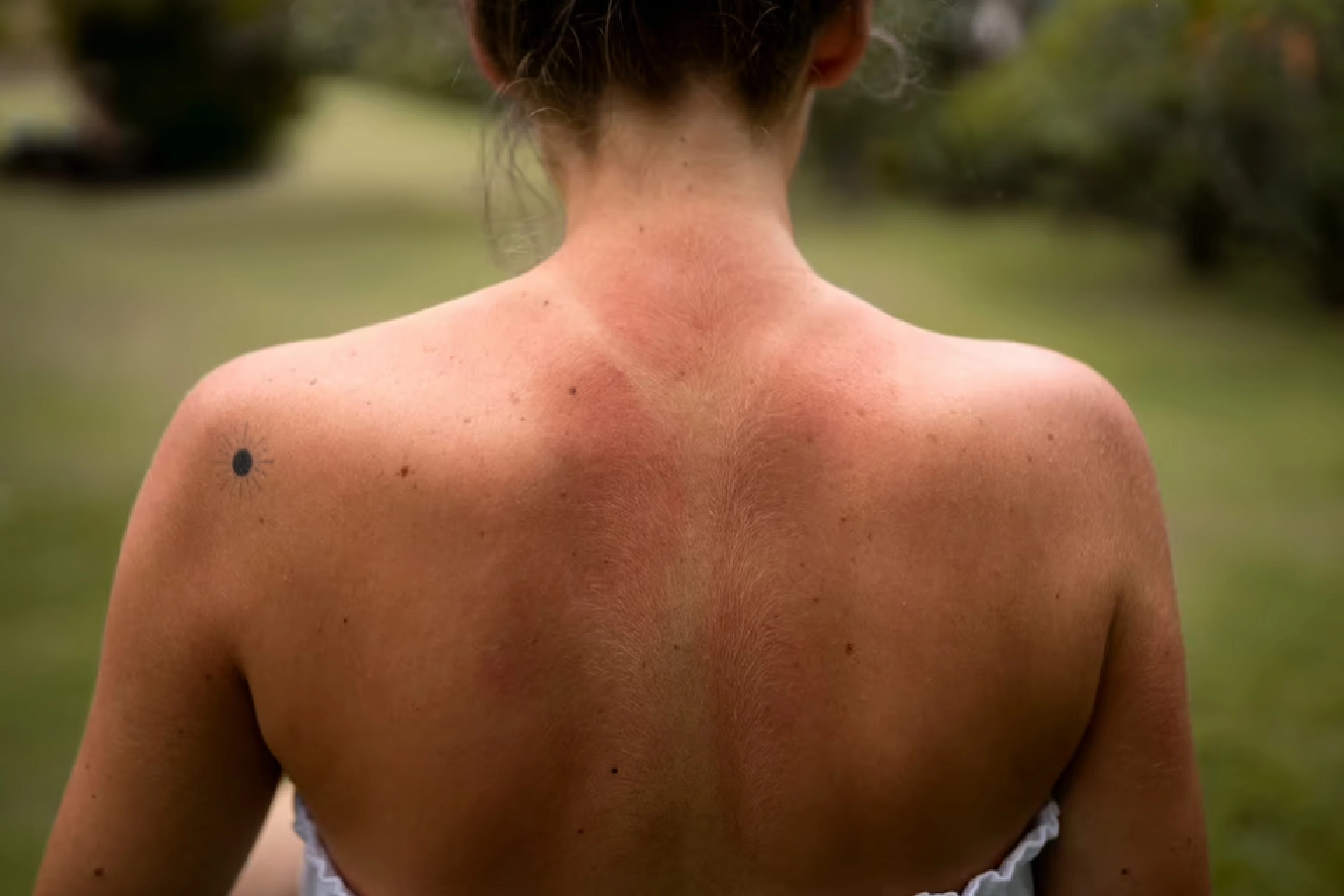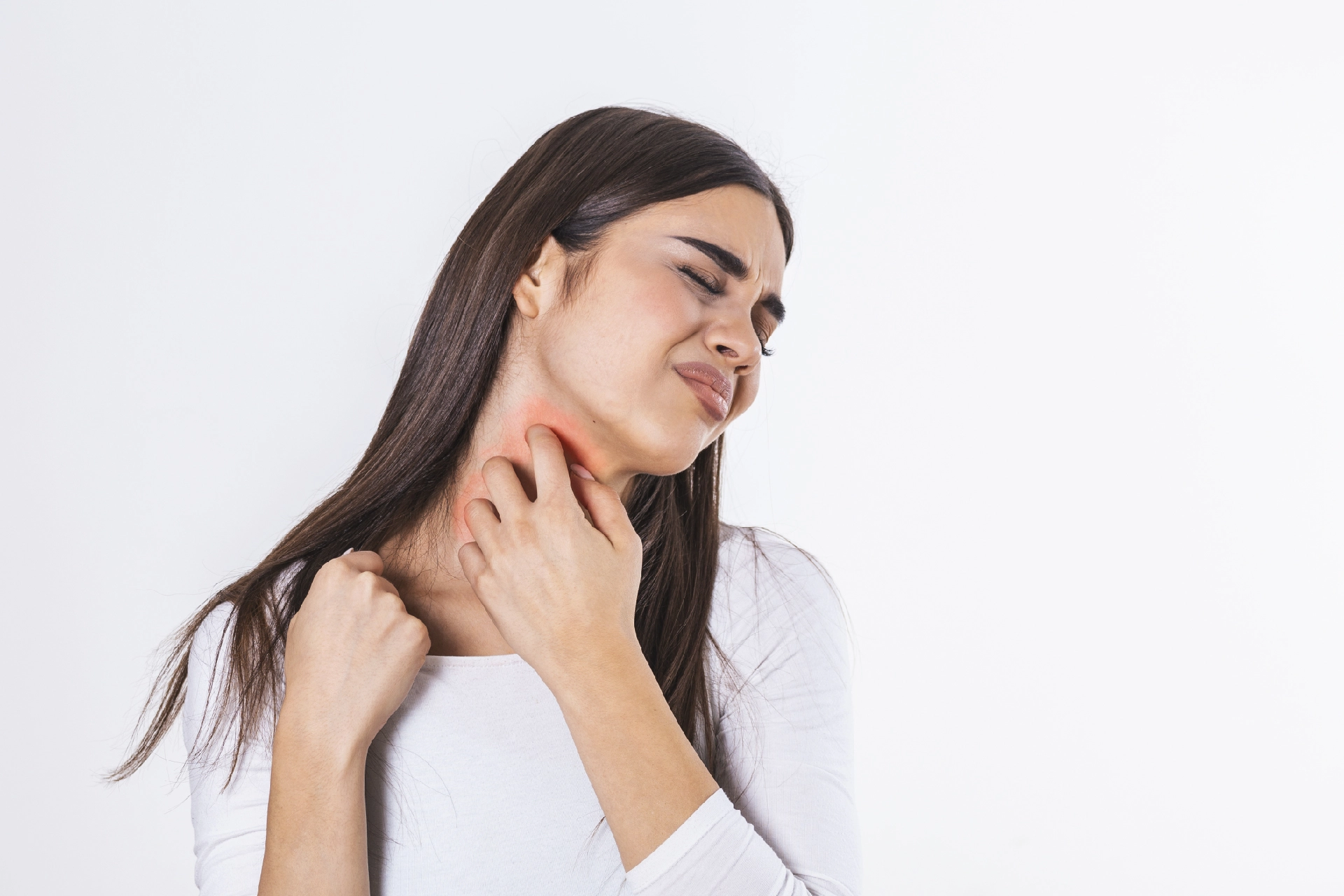Skin & Hair | 13 min read
How To Get Rid Of Acne: Home Remedies, Causes, Prevention
Medically reviewed by
Table of Content
Key Takeaways
- Use a gentle soap to wash your skin twice a day. Instead of a brush or a washcloth, use your fingers
- Studies have found that when under stress, the body releases hormones that can increase the amount of skin inflammation
- Using essential oils, green tea, and aloe vera on the skin appears to be the quickest approach to getting rid of pimples
For many, skincare is a top priority, especially when dealing with acne breakouts. To make matters worse, acne is amongst the more common skin conditions and is known to affect over 85% of people at some point in their life. Moreover, a nasty breakout not only affects your skin health but can also have adverse effects on the mind. Acne breakouts can undermine a person’s self-confidence and may even be a cause of anxiety or stress, which can further aggravate the condition. For this reason, acne treatment is quite popular and a quick online search for ‘how to get rid of pimples’ or ‘how to cure pimples’ should get you helpful results.
However, it is important to note that many conventional solutions have known side effects, and this is why home remedies for acne have become more popular. These generally take a more natural approach to pimple treatment and may be perceived as much safer alternatives. To properly learn how to reduce acne, you must know that it takes more than simply applying facial scrubs or creams for spot treatments. This is where the importance of following a proper diet and leading a healthy lifestyle comes into play as they have just as much of a role to play in the prevention of acne.
To help you learn how to get rid of acne naturally and safely, here’s a brief explanation of the causes of acne followed by the top home remedies for pimples.
Causes of Acne
Before getting into the details of how to reduce acne, it is important to learn about the various causes of this common skin ailment. This can help you better understand treatment procedures and help with prevention too. Acne occurs when the pores in the skin, called hair follicles, get clogged with oil and dead skin cells. Here, an excess of the oily substance known as sebum, along with dead skin cells, blocks the pores on the skin. As a result, the Propionibacterium acnes bacteria grows and the white blood cells in the body attack the bacteria. This results in inflammation and acne, which have a few different forms, namely, blackheads, pimples, or whiteheads.
Factors Can Trigger Acne Are:
- Diet
- Stress levels
- Genetics
- Hormones
- Infections

Home Remedies For Acne
With a better understanding of what causes acne, it is clear that keeping your skin clean alongside managing inflammation is a smart way to go about reducing acne. To that end, here are the best home remedies for pimples you can try for yourself.
1. Keep your hands away from your face
- Dermatologists all agree that you should never pick at a pimple. Don't pick at your pimple.
- Doris Day, M.D., a dermatologist in New York City and the author of 100 Questions and Answers About Acne, cautions against picking at acne lesions: "It may seem alluring, but keep in mind that picking at an acne lesion can make it take longer to cure and is more likely to scar."
2. Use apple cider vinegar
- Apple cider vinegar is made by fermenting apple cider or the unfiltered liquid from crushed apples. Research has shown that it, like other kinds of vinegar, can combat a wide range of microorganisms.
- Citric acid, for instance, is present in apple cider vinegar. Citric acid, in combination with zinc oxide, has been shown in research from 2016 to destroy Pimples and acne.
- According to a 2017 study, the lactic acid in apple cider vinegar may also help to reduce the look of acne scars.
- While some apple cider vinegar components may aid with acne, there is presently no evidence to support its usage for this reason. Some dermatologists advise against using apple cider vinegar at all since it may irritate the skin.
How to Use apple cider Vinegar:
- One part apple cider vinegar to 3 parts of water (use more water for sensitive skin).
- After cleaning, apply the mixture to the skin gently using a cotton ball.
- Allow it to rest for 5 to 20 seconds before rinsing with water and patting dry.
- As needed, repeat this treatment 1 to 2 times each day.
3. Utilize a zinc supplement
- Zinc is a mineral that is essential for immune system health, hormone production, and cell growth.
- Compared to other natural acne remedies, it has received comparatively little research.
- According to a 2020 meta-analysis, individuals treated with zinc had significantly lower inflammatory blemish counts than those who were not.
- The suggested safe upper limit for zinc is 40 mg per day, so unless you're under the guidance of a medical expert, it's usually better not to exceed that quantity.
- Excessive zinc consumption might result in stomach discomfort and intestinal inflammation.
- It's also worth mentioning that applying zinc to the skin hasn't been effective. This might be because zinc is poorly absorbed via the skin.
4. Create a honey and cinnamon face mask
- According to a 2017 study, the combination of honey and cinnamon bark extract has antibacterial properties against Pimples and acne.
- According to 2020 research, honey can inhibit or destroy the growth of Pimples and acne on its own. However, this finding does not necessarily mean that honey is an effective acne therapy.
- According to 2016 research of 136 acne patients, adding honey to the skin after using antibacterial soap was no more successful at curing acne than using the soap alone.
- While the anti-inflammatory and antibacterial qualities of honey and cinnamon may help with acne, additional study is needed.
Usage:
- Two tablespoons of honey and one teaspoon of cinnamon combined to produce a paste.
- Apply the mask to your face after cleaning and keep it on for 10 to 15 minutes.
- Rinse the mask well and massage your face dry.
5. Tea tree oil can be used to treat certain areas
- Tea tree oil is an essential oil derived from the leaves of Melaleuca Alternifolia, a tiny Australian tree.
- According to 2018 research, using tea tree oil on the skin may help decrease acne.
- In a small 2019 trial, individuals using a tea tree oil ointment for acne had less dry skin and discomfort when compared to benzoyl peroxide. They were also happy with the therapy.
- 2017 research found that tea tree oil may be an effective alternative to topical and oral antibiotics, which might induce bacterial resistance if taken for an extended period of time.
- Tea tree oil is quite concentrated, so dilute it before applying it to your skin.
Usage:
- Nine parts of water should be added to one part of tea tree oil.
- Apply the mixture to the afflicted regions using a cotton swab.
- If desired, apply moisturizer.
- As needed, repeat this treatment 1 to 2 times each day.
6. Use green tea on your skin
- Green tea is abundant in antioxidants, and drinking it might help you stay healthy. Additionally, it could lessen acne.
- According to a 2017 study, this is likely due to the polyphenols in green tea, which help combat germs and decrease inflammation, both of which are major causes of acne.
- There hasn't been much research into the benefits of drinking green tea for acne. Therefore further research is needed.
- In a tiny 2016 trial, 80 women received 1,500 mg of green tea extract daily for four weeks. Women who used the extract had less acne on their noses, chins, and around their mouths towards the end of the study.
- Green tea applied to the skin may be beneficial as well.
- According to a 2020 study, using green tea extract on the skin considerably lowers sebum production and pimples in acne sufferers.
- Green tea creams and lotions are available to buy, but making your own at home is just as straightforward.
How to Use:
- Steep green tea for 3 to 4 minutes in boiling water.
- Allow the brewed tea to cool before serving.
- Apply the tea to your skin with a cotton ball or spritz it on using a spray bottle.
- Allow it to dry completely before washing and patting your skin dry.
- You may also construct a mask with the remaining tea leaves and honey.
7. Use witch hazel
- The bark and leaves of the North American witch hazel plant, Hamamelis virginiana, are used to make witch hazel.
- There appears to be a very little study on witch hazel's effectiveness in curing acne, particularly at the moment.
- Thirty people with mild to severe acne underwent a three-step facial treatment twice daily for six weeks in a small 2017 trial supported by a skincare firm.
- One of the substances in the second phase of the therapy was witch hazel. By the end of the research, the majority of individuals had shown considerable improvement in their acne.
- Witch hazel may also battle germs and minimize skin irritation and inflammation, which can all contribute to acne, according to 2019 research.
How to Use:
- In a small saucepan, combine 1 cup water and one tablespoon of witch hazel bark.
- After soaking the witch hazel for 30 minutes, bring the mixture to a boil on the burner.
- Reduce to low heat and cover for 10 minutes.
- Set aside for 10 minutes after removing the mixture from the heat.
- After straining, put the liquid in a tightly sealed container.
- Apply with a cotton ball to clean the skin 1 to 2 times a day or as needed.
- It is crucial to remember that commercially produced versions may lack tannins since they are frequently lost during the distillation process.
8. Use a warm compress
- According to Margarita Lolis, M.D., board-certified dermatologist at Schweiger Dermatology Group in Hackensack, NJ, "heat is a really simple technique to calm your skin if you sense a blemish coming on." "Bring everything to the surface with a warm compress or steam," she says.
- You may also use a cold compress to reduce the swelling of a very big, unpleasant lesion.

9. Aloe vera
Aloe vera is a trusted solution for many skin conditions ranging from rashes to burns. It is effective at treating acne because it contains sulphur and salicylic acid, both of which may reduce acne by fighting against bacteria. To use it, simply take the gel from the aloe plant and apply it directly to the skin as a moisturizer. Make it a point to use pure aloe vera gel for the best results. Keep in mind that aloe vera can be effective against existing breakouts and with healing acne scarring as well, but may not help prevent a future acne breakout.
10. Tea tree and other essential oils
Many essential oils have been found to be effective in fighting acne-causing bacteria. Among the more common ones are tea tree oil, clove oil, rosemary oil, lemongrass oil, and lavender oil. These oils help keep acne in check, in different ways, and studies have been conducted on their efficacy. For instance, a study found that tea tree oil fights the S. epidermidis and P. acnes bacteria, both of which are responsible for pimples. This is also the case with lavender and clove oils, while lemongrass and rosemary proved to inhibit the growth of the P. acnes bacteria. While most of these oils are safe to use, some, like tea tree oil, are quite potent and will cause irritation if directly applied to the skin. However, this can be mitigated by using a carrier oil with it. However, it is best to consult a specialist for the right ratios.
11. Honey
Honey is actually an age-old treatment option for acne and other skin conditions. It has antioxidant and antibacterial properties that work towards handling acne problems. Honey can help clear blocked pores and can help wounds heal without any further bacterial infection. Common ways to use honey are to mix it into a face mask or rub it onto pimples with a cotton pad. Here, raw honey is preferred for the best results. Further, remember that honey may only help reduce redness and not remove dirt from clogged pores.
12. Stress reduction
Studies have found that when under stress, the body releases hormones that can increase the amount of skin inflammation and sebum produced. What’s more, when you are stressed, your body’s healing effectiveness reduce by up to 40%. It is no surprise that stress was also linked to increased acne severity. Naturally, a good solution and preventive measure would be to keep stress in check.
While there are several ways you can go about doing reducing stress, here are few good examples to consider.
- Meditate for a few minutes every day
- Read a book or listen to soothing music
- Sleep better, without getting distracted by your phone
- Talk to someone to relieve tension
- Eat right with enough vegetables in your diet
- Perform physical activities like walking or play your favorite sport
13. Exercise
Exercise is especially great at keeping acne at bay as it not only relieves stress but can also keep hormone levels in check. Moreover, it promotes good blood circulation in the body, which in turn helps nourish the skin and plays a part in healing. So, exercise regularly and try to get in at least 30 minutes of activity a few times a week.
Some of the best and easiest exercise ideas are:
- Lifting weights
- Brisk walking
- Cycling
- Playing frisbee
- Jogging or running
- Skipping
- Dancing
- Yoga
Treatment and Medication For Acne
Acne may be treated using light treatment
- Instead of visiting your doctor for red and blue light treatment (which may cost up to $100), use an at-home gadget for two minutes over a blemish or your entire face.
- The red light is used to minimize acne inflammation, while the blue light is used to target acne-causing bacteria.
- Furthermore, the light encourages collagen production in the skin's dermal layers. As a result, acne scars fill up, and the skin appears more even-toned.
If required, medicate
- For patients suffering from cystic acne, a mix of topical therapies, in-office treatments (such as lasers), and medication is frequently the best option.
- A dermatologist can help you select drugs that will benefit your therapy in the long term.
- "Systemic drugs such as oral antibiotics and hormonal treatments (oral contraceptives, spironolactone) are frequently used to treat nodular acne," explains Valerie Harvey, M.D., a dermatologist in Newport News, Virginia.
- Isotretinoin, a vitamin A derivative, is also quite effective.
How to Prevent Acne
While there is no perfect technique to get rid of acne forever, there are several behaviors you may include in your daily routine that may help keep outbreaks away. Here are some suggestions:
Avoid Popping Pimples:
Popping pimples can result in bleeding, severe scarring, or infection. It may also irritate and block nearby pores, exacerbating your acne problem.
Wash your face properly:
Excess oil, filth, and sweat should be removed from your face regularly to help avoid pimples.
Use a moisturizer:
Even if you have acne, it is critical to keep your skin moisturized. When skin becomes dry, it generates oil to compensate, leading to excess sebum and plugged pores.
Avoid Makeup Regularly:
Wearing too much Makeup can clog pores and cause breakouts. To avoid skin sensitivity, apply Makeup that is non-comedogenic and fragrance-free. Always remove your Makeup before going to bed.
Refrain from touching your face:
Touching your face can spread germs and pore-clogging pollutants to your skin.
Limit sun exposure: Sun exposure dehydrates the skin, causing it to produce more oil and plug pores over time.
Now that you are aware of the 5 top natural home remedies for acne, try them out the next time you or a loved one experiences breakouts. In fact, these natural solutions are generally much safer when compared to the use of chemical creams or treatments to treat pimples.
However, this doesn’t mean that your skin can’t have an undesired reaction to natural products. Some remedies such as the use of garlic, as both a spot treatment or a dietary addition, can worsen the situation by causing skin irritation or an allergic reaction. For this reason, the best approach when you have a consistent problem with acne is to consult a skincare specialist. You can connect easily with top dermatologists on Bajaj Finserv Health and book appointments online, thus making the process much simpler. This makes getting the right medical advice easier than ever, as you don’t have to step out of the comfort of home to get treated.
References
Disclaimer
Please note that this article is solely meant for informational purposes and Bajaj Finserv Health Limited (“BFHL”) does not shoulder any responsibility of the views/advice/information expressed/given by the writer/reviewer/originator. This article should not be considered as a substitute for any medical advice, diagnosis or treatment. Always consult with your trusted physician/qualified healthcare professional to evaluate your medical condition. The above article has been reviewed by a qualified doctor and BFHL is not responsible for any damages for any information or services provided by any third party.



